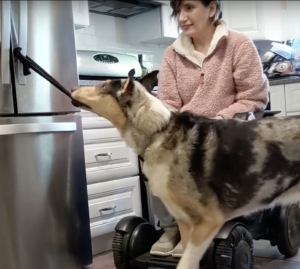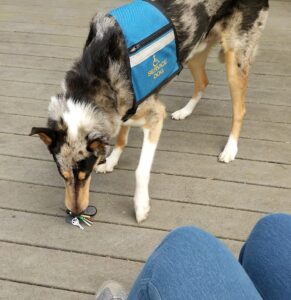Barks Blog
The Hand-Delivered Retrieve
By Veronica Sanchez

The hand-delivered retrieve is an important task for many service dogs and a wonderful skill for pet dogs. Service dogs trained to help a person who has a mobility impairment, a mental illness or a neurological condition often must be able to perform numerous retrieve-based tasks. Pet owners may want their dogs to retrieve a few items for enjoyment or to simply help out around the home. Owners who participate in Rally or other types of competitive obedience may need their dog to retrieve for performance activities.
Retrieving in play, unlike a trained retrieve, involves channeling a dog’s predatory instincts. The dog chases a toy that is thrown, picks it up and returns it to the owner. Dogs often chew and shake the item when doing this type of retrieve. On the other hand, a dog who is trained to retrieve should not chew, shake or otherwise play with the item they are retrieving. Service dogs often retrieve items like cell phones and medication bottles that could be damaged. Additionally, a dog performing a trained retrieve is not chasing an object that has been thrown. For instance, a pet owner may want the dog to retrieve slippers that are under a bed. While it may be easier to teach a dog who retrieves in play to perform a trained retrieve, dogs who do not retrieve in play can still learn this skill.

As helpful as a service dog’s retrieving can be for a person with a disability, the components of the retrieve — taking items from a person’s hand or picking them up off of a surface, holding, carrying and delivering them — are themselves foundation skills for other service dog tasks. For example, taking and holding are combined with pulling to train a dog to open a door using a tether and to train a dog to help a person take off a sweater. Carrying bags, placing items in the trash, and giving items to other people all involve components of the retrieve. Taking the time to train each component of the retrieve can be challenging, but the rewards are well worth it!
Read more on this topic in the May 2020 issue of BARKS from the Guild!
About the Author
Veronica Sanchez M.Ed, CABC, CPDT-KA is the founder of Cooperative Paws Service Dog Coach™, an educational certification program for professional trainers in service dog training and a Pet Professional Guild corporate partner. She is also the author of the book, Service Dog Coaching: A Guide for Pet Dog Trainers, to be published this year. As a dog trainer with a disability, her passion for service dogs is personal as well as professional. You can learn more about Veronica and her educational programs online at www.cooperativepaws.com.

